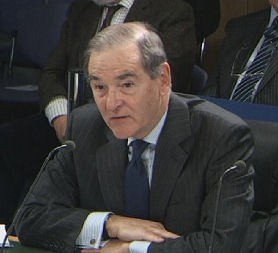Iraq inquiry: UN diplomat 'considered resigning'
Updated on 27 November 2009
Diplomat Sir Jeremy Greenstock, a key figure in UN negotiations before the 2003 Iraq invasion, tells the Chilcot inquiry he considered resigning over the push to regime change.

As a permanent representative from 1998 to 2003, Sir Jeremy was present at the United Nations in the run-up to the 2003 invasion of Iraq.
He told the inquiry, chaired by Sir John Chilcot, that the conflict in Iraq produced the greatest divisions at the UN.
Sir Jeremy said he warned his superiors he would resign if the UN Security Council failed to pass a resolution on Iraq. The resolution was essential for the UK to become involved in "internationally legitimate" military action, he told the panel.
The security council approved resolution 1441 on 8 November 2002, paving the way for the return of weapons inspectors to Iraq.
Britain and the US were then unable to get a second UN resolution directly authorising war after arguing that Saddam was not co-operating with the inspectors and was deliberately delaying.
The lack of a second resolution has led many critics of military action to argue that the invasion was illegal under international law - an allegation the British government has always denied.
Sir Jeremy is the first witness at the inquiry to produce a statement about developments at the UN during his time as ambassador. View it in full here.
Speaking to the inquiry panel, he said he was kept in the dark about the private discussions taking place between former British prime minister Tony Blair and former US president George Bush.
He said he realised there had been a shift, following the two leaders' meeting at Bush's ranch in Crawford, Texas, in April 2002. The meeting is believed to be the moment Blair voiced his support for a regime change in Iraq.
"It wasn't until the Crawford meeting of 2002 that I realised the UK was being drawn into quite a different discussion. That discussion was not totally visible to me," he said.
"I was not being politically naive but I was not being politically informed either."
Sir Jeremy wrote a book about his role in the Iraq war which was later blocked from publication by the Foreign and Commonwealth Office.
The diplomat went on to criticise the Bush administration's pro-war stance for damaging British attempts to build international agreement on how to deal with Iraq.
He said in his statement: "The UK's attempt to reconstitute a consensus had only a slim prospect of success, made slimmer by the recognition by anyone else following events closely that the United States was not proactively supportive of the UK's efforts and seemed to be preparing for conflict whatever the UK decided to do."
After Sir Jeremy's evidence, the inquiry is due to reconvene on Monday. David Manning, a former aide to Tony Blair, will give evidence relating to UK policy on Iraq.



